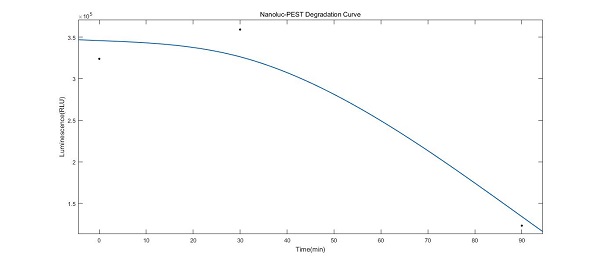Difference between revisions of "Part:BBa K1680009:Experience"
(→Applications of BBa_K1680009) |
|||
| Line 5: | Line 5: | ||
===Applications of BBa_K1680009=== | ===Applications of BBa_K1680009=== | ||
| + | |||
| + | This is from Team Tianjin of iGEM2018. We added a tag after ''Nanoluc'' named PEST. PEST sequence can be found in variety of eukaryotic cells and the sequence we used was from the literature Engineered Luciferase Reporter from a Deep Sea Shrimp Utilizing a Novel Imidazopyrazinone Substrate. The covalent linkage of ubiquitin to lysine residues of substrate proteins is a common means used by eucaryotic cells to signal their degradation by the 26S proteasome, a multiprotease complex located in the cytoplasm and the nucleus. Decades ago it had been demonstrated that the PEST regions, enriched with Pro, Glu, Ser, and Thr, were identified to indeed control the ubiquitination of regulatory short-lived proteins. | ||
| + | |||
| + | [[Image:ganggangnano.jpeg|center|frame|300px|<b>Figure 1. </b> Nanoluc-PEST Degradation Curve]] | ||
| + | |||
| + | Inspired by our time-course measurement for the KaiABC oscillatory system, we realized the importance of the sensitivity of reporter genes when used to characterize the variation in our engineering strains. | ||
| + | With the knowledge that the instability of proteins is associated with the existence of the so-called PEST regions, which control the ubiquitination of regulatory short-lived proteins, we decided to optimize our NanoLuc with the potentially degrading sequence PSET to shorten its intracellular lifetime. | ||
| + | |||
| + | You can learn more details [https://parts.igem.org/Part:BBa_K2637010 on this page]. | ||
===User Reviews=== | ===User Reviews=== | ||
Revision as of 13:46, 15 October 2018
This experience page is provided so that any user may enter their experience using this part.
Please enter
how you used this part and how it worked out.
Applications of BBa_K1680009
This is from Team Tianjin of iGEM2018. We added a tag after Nanoluc named PEST. PEST sequence can be found in variety of eukaryotic cells and the sequence we used was from the literature Engineered Luciferase Reporter from a Deep Sea Shrimp Utilizing a Novel Imidazopyrazinone Substrate. The covalent linkage of ubiquitin to lysine residues of substrate proteins is a common means used by eucaryotic cells to signal their degradation by the 26S proteasome, a multiprotease complex located in the cytoplasm and the nucleus. Decades ago it had been demonstrated that the PEST regions, enriched with Pro, Glu, Ser, and Thr, were identified to indeed control the ubiquitination of regulatory short-lived proteins.
Inspired by our time-course measurement for the KaiABC oscillatory system, we realized the importance of the sensitivity of reporter genes when used to characterize the variation in our engineering strains. With the knowledge that the instability of proteins is associated with the existence of the so-called PEST regions, which control the ubiquitination of regulatory short-lived proteins, we decided to optimize our NanoLuc with the potentially degrading sequence PSET to shorten its intracellular lifetime.
You can learn more details on this page.
User Reviews
UNIQca5c84bb62d5567d-partinfo-00000000-QINU UNIQca5c84bb62d5567d-partinfo-00000001-QINU

